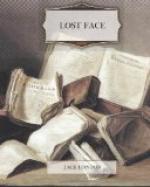The captain entered the pilot-house. “What’s the matter?” he demanded. “The water’s good.”
Akoon grunted. He saw a larger canoe leaving the bank, and in it were a number of persons. As the Seattle lost headway, he put the wheel over some more.
The captain fumed. “It’s only a squaw,” he protested.
Akoon did not grunt. He was all eyes for the squaw and the pursuing canoe. In the latter six paddles were flashing, while the squaw paddled slowly.
“You’ll be aground,” the captain protested, seizing the wheel.
But Akoon countered his strength on the wheel and looked him in the eyes. The captain slowly released the spokes.
“Queer beggar,” he sniffed to himself.
Akoon held the Seattle on the edge of the shoal water and waited till he saw the squaw’s fingers clutch the forward rail. Then he signalled for full speed ahead and ground the wheel over. The large canoe was very near, but the gap between it and the steamer was widening.
The squaw laughed and leaned over the rail.
“Then catch me, Porportuk!” she cried.
Akoon left the steamer at Fort Yukon. He outfitted a small poling-boat and went up the Porcupine River. And with him went El-Soo. It was a weary journey, and the way led across the backbone of the world; but Akoon had travelled it before. When they came to the head-waters of the Porcupine, they left the boat and went on foot across the Rocky Mountains.
Akoon greatly liked to walk behind El-Soo and watch the movements of her. There was a music in it that he loved. And especially he loved the well-rounded calves in their sheaths of soft-tanned leather, the slim ankles, and the small moccasined feet that were tireless through the longest days.
“You are light as air,” he said, looking up at her. “It is no labour for you to walk. You almost float, so lightly do your feet rise and fall. You are like a deer, El-Soo; you are like a deer, and your eyes are like deer’s eyes, sometimes when you look at me, or when you hear a quick sound and wonder if it be danger that stirs. Your eyes are like a deer’s eyes now as you look at me.”
And El-Soo, luminous and melting, bent and kissed Akoon.
“When we reach the Mackenzie, we will not delay,” Akoon said later. “We will go south before the winter catches us. We will go to the sunlands where there is no snow. But we will return. I have seen much of the world, and there is no land like Alaska, no sun like our sun, and the snow is good after the long summer.”
“And you will learn to read,” said El-Soo.
And Akoon said, “I will surely learn to read.” But there was delay when they reached the Mackenzie. They fell in with a band of Mackenzie Indians, and, hunting, Akoon was shot by accident. The rifle was in the hands of a youth. The bullet broke Akoon’s right arm and, ranging farther, broke two of his ribs. Akoon knew rough surgery, while El-Soo had learned some refinements at Holy Cross. The bones were finally set, and Akoon lay by the fire for them to knit. Also, he lay by the fire so that the smoke would keep the mosquitoes away.




